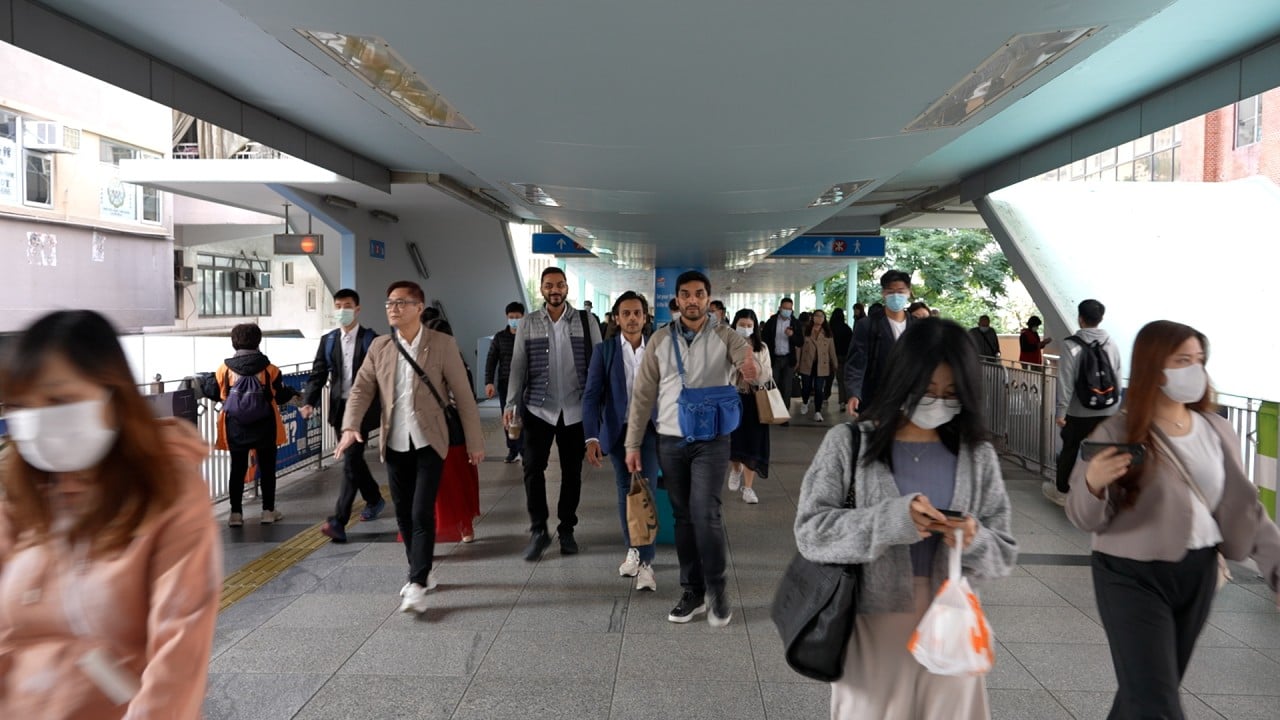
Hong Kong Covid-19 cases stay low, but more falling ill with flu since mask mandate dropped
- Sewage samples show significant drop in level of Covid-19 virus; number of serious cases also fell sharply
- Hospitals and clinics seeing more people with cough, fever and throat pain last month and in March
Covid-19 cases have stayed low in Hong Kong despite more mixing between mainland Chinese visitors and local residents, but flu infections have been rising since wearing masks became optional.
Health experts said people in the city and mainland China had built up hybrid immunity from natural infection and vaccination and this helped to keep the coronavirus in check since the border reopened early last month.
“Hong Kong has already established its hybrid immunity, and similarly for the mainland,” said Professor David Hui Shu-cheong, a Hong Kong government pandemic adviser. “When both places have hybrid immunity, there will not be much of a problem.”
Illnesses plague Hong Kong schools after mask mandate dropped: paediatrician
Latest data from the Centre for Health Protection (CHP) on Thursday showed that the level of coronavirus detected in the city’s sewage also continued to decrease.
Sewage samples from 120 surveillance points in urban areas covering about 6 million people showed a significant decrease in the level of Sars-CoV-2 virus, which causes Covid-19, between early February and the beginning of this month.

However, since the mask mandate was lifted earlier this month, people have become more susceptible to respiratory viruses they were not exposed to over the past three years.
Public hospitals and private clinics have been seeing more people complaining of flu symptoms such as cough, fever and throat pain last month and in March.

The daily number of Covid-19 cases detected by polymerase chain reaction tests fell from more than 470 in early February to a few dozen, although that did not reflect all infections.
Since January 30, doctors only have to report severe and fatal cases. Those who test positive using rapid antigen test kits at home also no longer have to inform the health authorities.
The number of severe and fatal Covid-19 cases dropped from about 20 a day early last month to fewer than 10 recently.
Most Hongkongers keep masks on, ‘averting possible flu surge’ as mandate ends
Quarantine-free travel resumed between Hong Kong and the mainland in early January after both weathered major waves of Covid-19 infections last year, allowing people to build up immunity as the vaccination effort continued.
The border reopened fully on February 6, without visitor quotas and pre-departure Covid-19 test requirements.
Respiratory medicine specialist Dr Leung Chi-chiu said: “Herd immunity has become more uniform. Even if there are imported cases, the impact they cause locally will be limited”.
Meanwhile, flu cases have begun edging up, though the level remained low.
Out of every 1,000 consultations in the emergency departments of public hospitals over a week from March 5 to 11, there were 113.2 cases with flu-like symptoms. The number had risen gradually from 94.9 early last month.
Public and private clinics also saw more patients with flu symptoms.
The flu-positive rate recorded by public laboratories rose from 0.63 per cent to 1.6 per cent, but this was still far below the threshold of 9.21 per cent indicating the start of a flu season.

The lifting of the mask mandate had contributed to the rise in flu cases, health experts said.
“Contact between people has been more frequent following the relaxation of social-distancing measures late last year. Many have also removed their masks recently,” Leung said.
He said Hong Kong did not see a surge in flu cases as spring had arrived earlier. The warmer weather was less favourable for viruses to spread and most people were wearing their masks in crowded public areas too.
Flu cases had also increased in nearby areas such as mainland China and Taiwan, the CHP data showed.
Chinese University’s Hui warned that another wave of Covid-19 infections could be sparked in June if visitors brought a new variant into the city.
Man arrested in Hong Kong after visiting 9 clinics in 5 days for free Covid drugs
But with regular testing no longer needed for visitors, only hospitalised patients would have to be screened to check if they carried new variants, he said.
A local paediatrician on Saturday said that schools had been plagued by outbreaks of respiratory syncytial virus and hand, foot and mouth disease following the removal of the mask mandate.

A cluster of cases of the virus was reported in a special care baby unit in Tuen Mun Hospital on Friday. A hospital spokesman on Sunday said a half-month old boy who was infected remained in critical condition, while a five-month-old baby was still listed as serious. He said four other infected babies were in stable condition.
Additional reporting by Edith Lin


